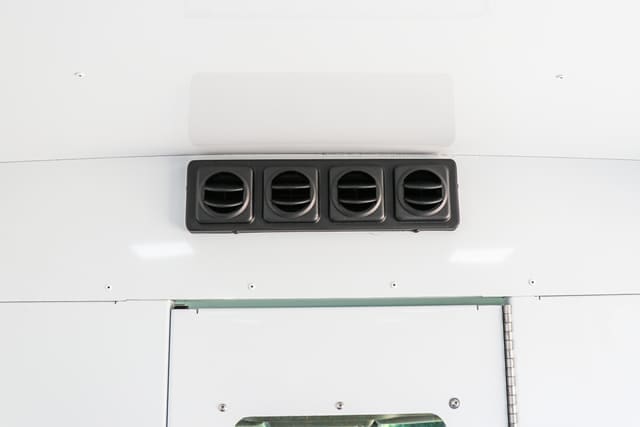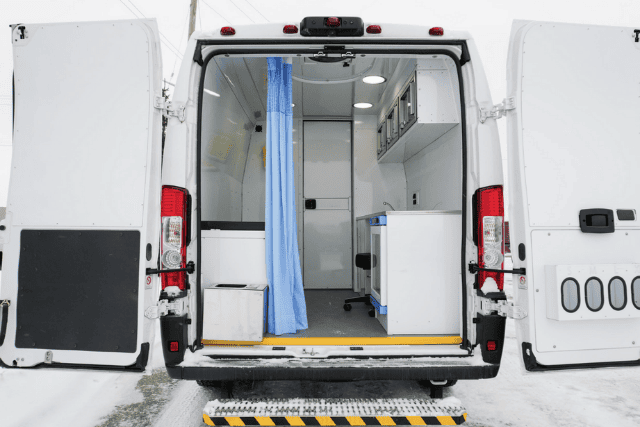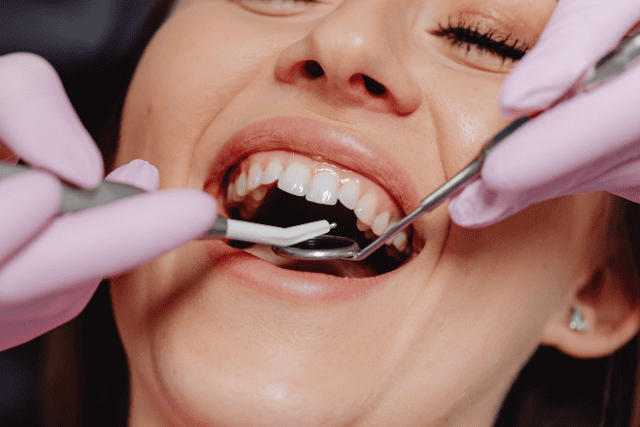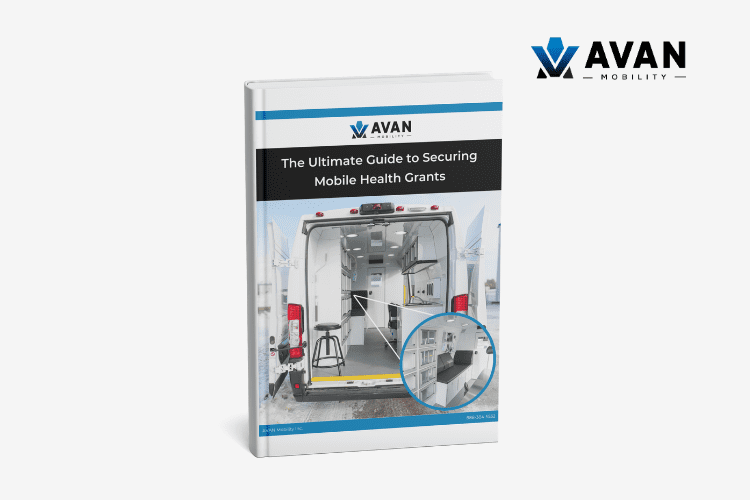Picture this: you’re trying to run a mobile clinic in the intense heat of Texas, California, or Florida. But instead of being a place of comfort, it feels like a sauna. Patients who may already feel uneasy about medical visits sit, sweating, and feeling uncomfortable. Staff struggle to focus, distracted by the relentless heat.
Poor mobile clinic air conditioning can affect comfort, safety, and even the quality of care provided. What’s at stake? Your clinic’s ability to offer a safe and welcoming space for healthcare. If you find yourself in this position or are considering different mobile clinic options, keep reading to learn more about the importance of effective cooling and what you can do to improve your mobile clinic’s environment.
At AVAN Mobility, we’ve spent over 10 years designing mobile clinics for organizations like yours and CalOptima that prioritize patient and staff comfort, no matter the weather. We’re dedicated to reducing barriers to healthcare through accessible, dependable vehicles that fit real-world needs. While we know we’re not the only choice, our commitment to comfort and safety is a big part of our work.
In this article, you’ll learn how poor mobile clinic air conditioning can affect patient comfort and safety in mobile clinics, along with a solution to create a comfortable, effective care environment.
How important is comfort in healthcare?
Did you know that patients have more positive health outcomes when they’re comfortable during healthcare visits? The more comfortable, relaxed, and safe a patient is during a healthcare appointment, the more open they are in sharing their concerns. For mobile clinics especially, comfort can make a huge difference in whether patients feel calm or stressed during their appointments.
Why does comfort matter?

Less anxiety: Half of Americans feel nervous at healthcare appointments. A cozy, welcoming space helps them feel at ease, making it easier to talk about what’s bothering them.
Builds trust: When patients feel comfortable, they’re more likely to trust the person giving care. As we mentioned earlier, this trust helps them ask questions, follow advice, and come back for follow-up appointments.
Better results: Comfort helps patients stay calm, making checkups and treatments go more smoothly. It also means patients are more likely to remember and follow advice they’re given.
Comfort for healthcare providers is just as important. Working in a space that’s too hot or uncomfortable makes it hard to stay focused and energetic all day. When staff are comfortable, they can give patients their full attention and show real empathy.
As you can see, comfort plays a big part in creating a safe, trusted place for patients and staff. In the next section, we’ll look at how mobile clinic air conditioning can make that happen.
Mobile clinic air conditioning: Creating healthcare comfort in hot climates
For many people, a mobile clinic might be their best or even only viable option for healthcare, especially if they live in rural, isolated areas. In places like Texas, Florida, and California, temperatures soar, and patients need a cool, comfortable place to receive care. Let’s take a closer look at the climates in each of these states to understand why effective air conditioning is so important.
Texas: Scorching summers and long heat waves
In Texas, summers are extremely hot, and people often experience weeks of intense heat. Here’s what the climate can look like:
- Average summer highs: 95°F to 100°F (35°C to 38°C)
- Heat waves: Temperatures can stay above 100°F for days in a row
- Humidity: Makes it feel even hotter and more uncomfortable
Stepping into a warm, stuffy clinic can make it hard for patients to relax. Cool air from a reliable AC system helps patients feel comfortable and valued, creating a calm space where they can focus on their health.
Florida: High heat and humidity
Florida is known for hot and sticky weather, especially in the summer months. The heat and humidity can be hard on anyone. Here’s a snapshot of Florida’s climate:
- Average summer highs: Around 90°F (32°C) with humidity making it feel hotter
- Humidity: Often over 70%, which can feel thick and oppressive
- Frequent storms: After a storm, the air feels even more humid and heavy
California: Dry heat and sunny seasons
California has a range of climates, but in places like the Central Valley and Southern California, the dry heat is a challenge. Here’s what it’s like:
- Average summer highs: 85°F to 100°F (29°C to 38°C) in many areas
- Dry air: Lack of humidity can make the heat feel intense and tiring
- Sun-soaked seasons: Long stretches of sunny, dry weather add to the heat
For many people in remote areas of these states, mobile clinics may be their best shot at healthcare. If the clinic doesn’t even stay cool, patients will feel exhausted and uncomfortable, which can overwhelm their visit.
What’s the solution for this? A dependable air conditioning system that helps create a cool, calm place where patients can relax and focus on their health instead of their discomfort.
What mobile clinic air conditioning options are there?
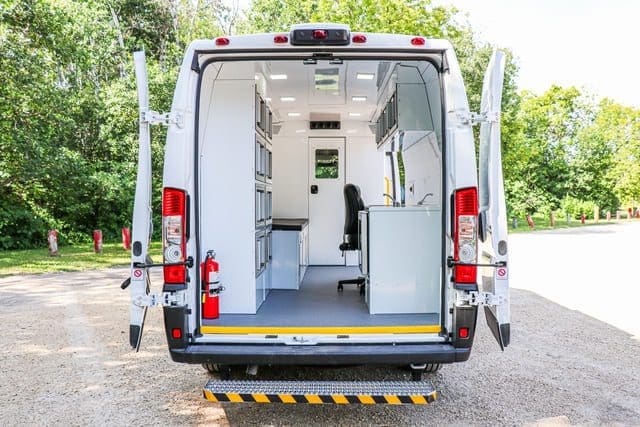
Keeping a mobile clinic cool and comfortable requires the right HVAC system, especially in scorching climates. The vans at AVAN Mobility have an HVAC system that uses ducting to spread cooled air throughout the vehicle. Plus, there are manual dampers in the ducts that let you control where the air goes so you can direct it to the areas that need it most.
Here’s a look at three reliable HVAC options from AVAN Mobility, each designed to meet different needs for mobile clinic environments.
Standard high-capacity system: Dependable cooling for typical needs
The standard high-capacity system is our most commonly used AC option. It connects to the existing HVAC system of the van, providing a practical solution for most environments.
How it works: This system uses the van’s built-in compressor and coolant loop, offering steady cooling for patients and staff.
Ideal for: Areas with moderate heat or clinics that need a dependable, straightforward option.
Considerations: Since it relies on the original van’s AC system, it might not handle extreme temperatures as effectively as standalone systems.
High-capacity standalone system: Powerful cooling for intense heat
The high-capacity standalone system is a game-changer in areas with more intense heat. This setup adds a separate HVAC unit solely for the back of the van, creating a dedicated cooling system for the clinic area.
How it works: A completely independent HVAC unit works in the rear compartment, in addition to the van’s OEM system, so it doesn’t strain the main vehicle AC.
Ideal for: Hotter climates, like California or Texas, where keeping the clinic cool is a top priority.
Impact: Patients and staff stay comfortable and can focus on their care, even in extreme temperatures.
Auxiliary HVAC system: Maintaining comfort when the van is off
For clinics that require cooling, even when the van is parked and turned off, the auxiliary HVAC system steps up to the plate. This setup is powered by a generator, allowing it to keep the interior at a stable temperature when the van’s engine is off.
How it works: This system operates independently from the vehicle’s AC, running off a generator to ensure the mobile clinic stays cool.
Ideal for: Long stops or remote clinic setups where turning off the van is necessary but maintaining comfort is also necessary.
Want to learn more about mobile clinic air conditioning?
If you’ve been reading this article, chances are you’re concerned about how poor mobile clinic air conditioning will (or maybe already is) affect patient comfort. By now, you’ve learned that a reliable HVAC system is important for creating a comfortable and relaxing environment, no matter how it is outside.
At AVAN Mobility, we understand the struggles healthcare providers face in areas with extreme heat, like Texas, Arizona, Florida, and California. That’s why we offer tailored HVAC solutions that will help reduce discomfort and stress and improve the overall healthcare experience in your mobile clinic.
Do you have any questions about mobile clinic air conditioning or anything else? Feel free to click the button below to talk to a mobility expert.
Not quite ready to reach out? No worries! We’ve got more resources to help you learn about mobile clinics.
Start by reading our article on mobile medical van customization. You’ll learn about some of the different modifications you can get with your vehicle.
By this point, you might also be wondering how costly mobile medical vans are. Check out the video below to learn more about that.
FAQ
Q: What are the risks of having poor air conditioning in a mobile clinic?
A: Poor air conditioning can make patients uncomfortable, leading to anxiety or fatigue during their visit. In extreme cases, it could even cause heat-related issues like dizziness or dehydration, which can affect the quality of care and patient satisfaction.
Q: Can I keep my mobile clinic cool without the vehicle running?
A: Yes, with the auxiliary HVAC system, you can keep the air conditioning running even when the vehicle is powered off. This system is perfect for mobile clinics that need to maintain a comfortable temperature while parked.
Q: Which states would benefit the most from a high-capacity HVAC system in their mobile clinics?
A: States with consistently hot climates, like Arizona, California, Florida, and Texas, would benefit greatly from a high-capacity HVAC system. These areas experience extreme heat, especially in the summer months, and having a robust cooling system is essential for patient comfort and safety.
